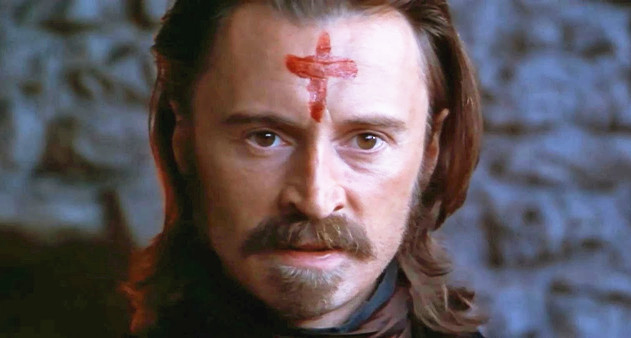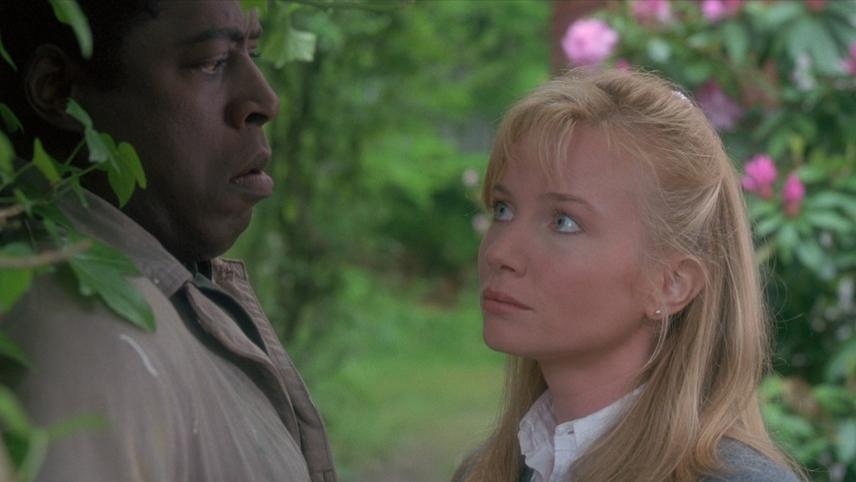6. Ravenous (1999)

It’s fair to say that with childish curiosity, I came across Ravenous. An appealing poster of dark colours, an ominous background, I was sold on that, rather than reading the plot. But even if I did, it wouldn’t have served me well. From a brief description, you gather what the film will entail, play out.
Ravenous doesn’t follow that formula. Set during the Mexican/ American war in the 1800’s, soldier John Boyd (Guy Pearce) escapes death by way of cowardice as his regiment are slaughtered. Commended, due to his survival but punished, he is exiled to Fort Spencer, joining a rag band platoon of misfits.
One night, a frostbitten man (a devilish turn by Robert Caryle) enters the camp. Cold, weak, he explains his wagon train with numerous men aboard, got lost in the mountains, only to resort to cannibalism to survive. Boyd along with the misfits, set off to explore the mountains, as the story and facts are not all what they seem. From the opening scene, as the audience we gather it is a western. Then the cannibalism commences, horror. Then crude jokes about the joys of eating flesh and tongue in cheek quips… ok is it a black comedy? It’s all three.
The problem with multi genres for one film is the tone is never consistent. To smirk, albeit, wryly over a scene with a faint comedic touch, when 30 seconds prior, a man was viciously executed and ate, doesn’t balance. The gore is satisfying for horror lovers. Robert Caryle gives an unsettling performance. Every character who interacts with him comes away unnerved. Guy Pearce, who has portrayed every persona from villain to hero, just about finds his rhythm. Unfortunately, it’s not a film high up on his impressive resume. They are a few moments, but these are few and a lot far between. It feels like three different movies, incorporated into one.
There is nothing wrong with making a film with several genres attached. But focus on one, to give it a defining tone. Ravenous it may be called but hungry for more I was not.
7. The Hand That Rocks the Cradle (1992)

When I review thrillers, I generally conclude that the 90’s was the most consistent decade producing them. Silence Of the Lambs. JFK. Speed. Seven. It’s like the directors and screen writers were blessed with the knowledge of what pulses the audience’s fingers were on.
The film begins in a picturesque, suburban town in Seattle. Dr Victor Mott (star trek alumni John De Lancie) an obstetrician, sexually molests one of his patients, Claire Bartel (Annabelle Sciorra) who informs the medical board of the assault and in turn, Dr Mott commits suicide, coinciding with other women who step forward with their own accusations. Widowed, penniless due to her doctor husband’s legal matter, Mrs Mott (played by the mesmerising Rebecca De Mornay) heavily pregnant, suffers a miscarriage. Six months pass and Claire Bartel needs a nanny, Mrs Moff, aware through the newspapers of Claire’s accusation of Dr Moff, applies for the role, going under the alias of Peyton Flanders. Curtis Hanson, who would later direct LA Confidential, and the Eminem led 8-mile takes an unpresumptuous approach.
The film doesn’t hint or mystify of who’s who and agendas. We know straight off the bat who Mrs Mott is and her reasoning for infiltrating the Bartel household. The appeal is cunning. Charming, beautiful, homely and a vibrancy that matches the idyllic setting, De Mornay endears herself to the Bartel family. Her essence of consideration breathes life into the term ‘godsend’ for the Bartel family. Each scene with De Mornay, is a gain of trust, an insight into their lives, what makes them tick, their vulnerabilities… what would dismantle this family?
De Mornay executes with pinpoint precision how her character should be. For example, she is aware that Claire suffers from asthma and with devious intent, exasperates a situation involving an asthma attack. Solomon (played with surprising conviction by Ghostbuster Ernie Hudson) an intellectually challenged man who associates with the Bartels, is accused by Claire Bartel of a despicable act against her daughter. Peyton, of course orchestrating the whole event due to Solomon witnessing something damning against her.
This charming act quickly dissolves with each act De Mornay commits, however sly or low key it appears. She is a despised character by the halfway mark. Hanson doesn’t dwell on her anguish or her misfortune that she herself has suffered, rather the simmering rage pent up inside of her, desperate to be unleashed in one fatal blow but for satisfactory purposes, to be dished out in suspicious, calculated acts. Revenge is a dish best served cold, for Mrs Moff, sub-zero is apt.
8. Sisu (2023)

Koshchei, translated from Russian, meaning, The Immortal. It is a word uttered by a Nazi officer to his superior inside a cramped tank. Fatigued, weary, on the cusp of losing the second world war, the officer explains, accompanied by angelic harmonies and a montage of a bloodied man, that a Finnish commander, after losing his home and family to the Russian army, becomes a ruthless one-man death squad, executing Russian patrols on his travels. The officer, solemn as he details the buck story to his ignorant superior, isn’t passing time. He is scared. His country has lost the war, he doesn’t want to lose his life. Koshchei. All this is 30 minutes into the film.
Sisu doesn’t change the formula. Bad guys attempt to kill protagonist, protagonist seeks revenge, all of that happens. Jorma Tomilla who plays the Finnish commander, does not utter one word throughout the film (aside from the final scene). In the desolate Finnish backdrop, Tomilla never breaks his stoic expression. His character projects a menace, a brooding terror that intimates to the audience, his quiet demeanour speaks volumes.
With Tarantino inspired gore, a slick story of pure entertainment that doesn’t let the violence deviate from it, Sisu, courtesy of Finland, proves a film doesn’t need to be American to dish out thrills and fun. And the most important part, Nazi’s getting blown up, bludgeoned, shot, massacred. What’s not to like?
9. The Guest (2014)

That’s the joy of film, an unexpected one if that. To become accustomed to something, let’s say an actor, in a role that elevates him, only to break that mould and star in something that deviates so far from said role. So, imagine my shock (a pleasant one) upon seeing Dan Stevens, an elegant, refined character appearing on Downton Abbey, transforming himself into a hybrid creation of The Terminator and Jason Bourne.
Stevens plays David, a US army sergeant, paying a visit to the Peterson family, currently grieving over their son’s death after his deployment to Afghanistan. David introduces himself as their son’s best friend, honouring his memory and their friendship by a way of helping the family through their tough time. David is courteous, polite and radiates a self-assurance that immediately bewitches the family. Such that, he is invited to stay with the family. Because the Peterson’s family are wrapped in grief and general dysfunction, it’s easy for them to miss the edge in David’s personality.
The Peterson’s youngest son encounters bullies at school, aware of this, David deals with them in rather unconventional methods. Spencer Peterson, the patriarch, complains about work, a short time elapses and his boss dies in mysterious circumstances. Spencer is promoted. Only Anna is suspicious of the mysterious David and phones his army base for information… the plot then thickens.
Adam Wingard (Godzilla x Kong) leads us down a no holds barred romp. Beneath the charming exterior, David is cold, ruthless, purposeful in every action he commits. We’re not supposed to get emotionally involved, Wingard maintains this. Only by what David says, nothing is revealed and his point is to keep it that way for the sake of everybody…. The action sequences are beautifully choreographed, real effort is involved to ensure Stevens is a disciplined, effective killing machine.
Of course, all is revealed by the third act, the usual army cover up and involvement but that makes David’s pathology all the clearer. Dan Stevens exudes coolness, confidence. Mysterious, tall, handsome, charming enough to get what he wants without getting attached. As the saying goes, all men want to be him, all women want to be with him.
10. I Came By (2022)

Netflix has a habit. To quote the adage, more quantity than quality. One restless night and far too much to choose from, I began to scroll the categories of Netflix. My frustration seemed to be endless, to relax and choose a film started to become arduous. I finally accepted I Came By as my choice of viewing.
23-year-old Toby is a political activist, who breaks into the houses of the high echelon of London’s society, to spray paint on their walls, I Came By. His latest target is prominent judge, Sir Hector Blake. But a routine act of defacement turns into something sinister. Hugh Bonneville stars as Sir Hector. He is arrogant, pompous, all the while appearing to be righteous in political and societal dealings. However, running at a little less than two hours, it does feel longer.
Too many characters are introduced, disrupting the narrative. One character is not convinced. Another character convinces them and then the two of them convince the third, dubious character. The pay off, however sates the anger you feel for Sir Hector, his snobbish demeanour and flaunting of his privilege, especially relevant given economic times. I Came By is a solid thriller, adding a social commentary without it overshadowing the film itself.